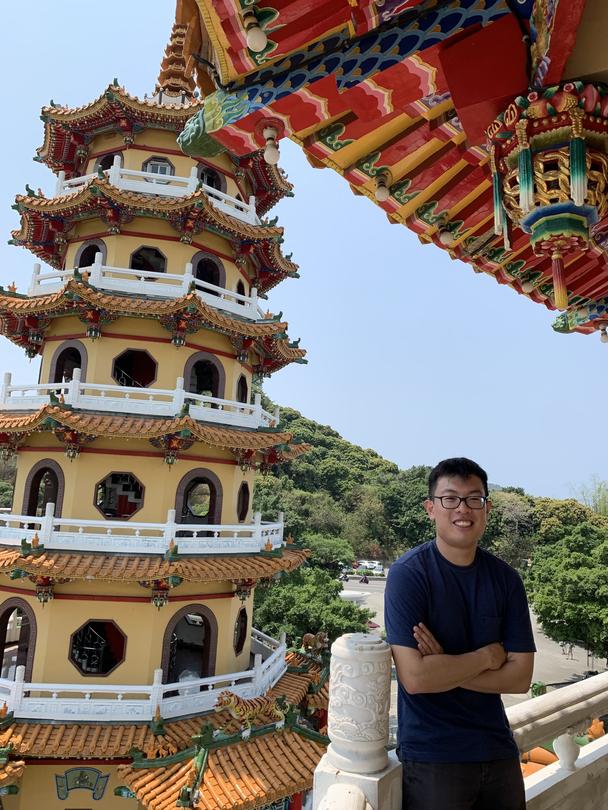Fellowship Profile: Winston Lie ’20, Fulbright study award to Taiwan

Winston Lie ’20, currently based in Taipei while pursuing a two-years master's program in global health, reflects on his Fulbright experience and shares his advice for students who are interested in applying for the Fulbright U.S. Student Program.
What has been the best piece of advice that you got about applying for Fulbright?
Start thinking about it early. The Fulbright Program is incredibly vast, with over 150 countries to choose from and all sorts of scholarship categories to consider whether it be in study, teaching, research, etc. When I say plan ahead for the Fulbright application, I don't mean you need to write your application materials a year in advance, instead I suggest you take some time to reflect on your Princeton experience. Some questions to think about, and what guided me when I applied, are "What are the things you've enjoyed from undergrad?", "What are the things you want to do more of?", "What are some things you didn't get the chance to do but wanted to?" Additionally, I found it really helpful to search videos and read articles online of all the different places I was considering. It was a great way to get excited about the Fulbright Scholarship and to do some fun "research".
What have you learned about yourself during your Fulbright experience?
I think one of the biggest lessons I've learned about myself is how much I enjoy meeting new people and learning about different cultures. For my Fulbright Grant, I'm based in Taipei, which is this vibrant, international city. During my year and half stay in the country, I've been able to make so many incredible friends, not only with local Taiwanese people but also classmates from Indonesia, Philippines, Vietnam, China, Thailand, India, and so many other unique places. It's been amazing to be able to talk about and listen to each other's different life perspectives and backgrounds. Although I came to Taiwan thinking I would only learn about Taiwanese traditions and customs, I've been able to discover so much more and meet many great people while doing it.
What advice would you have for how to choose which country to apply to or for someone who is nervous about going abroad?
In terms of choosing a country, I'll admit it's pretty difficult. It's really hard to go wrong with any of the potential Fulbright host countries! They are all great! I think the best advice I can offer for choosing a country is by encouraging students to reflect on what they hope to learn from pursuing a Fulbright Grant and what their goals are for the future. Speaking of my own experiences, I wanted to study global / public health before attending medical school as I was incredibly interested in the subject but didn't have the chance to study it at Princeton. Additionally, I wanted to travel to Asia after college as I've never been to this part of the world before and didn't know too much about the region. These reasons ultimately motivated me to pursue a two-year master's program in global health in Taiwan. If you are still unsure of which country to apply to and what type of grant to pursue, go to the OIP Office and talk to Dr. Gump! Dr. Gump was incredibly helpful when I was applying and was actually the reason why Taiwan became on my radar in the first place! As for the second question, I think it is perfectly normal to be nervous about going abroad. It's a huge change after all! I will say, regardless of which country you choose, the Fulbright programs in each region are immensely supportive and will help you during your entire stay. Additionally, there will also be other Fulbrighters you'll meet in your host countries who will be another important support network. In fact, some of my closest friends in Taiwan are other Fulbrighters I've met. Just know that although you are going abroad, you aren't alone!
What myths are there about Fulbright that you want to debunk for any prospective students who are nervous about applying?
I think one of the most prevalent misconceptions about the Fulbright Grant is that to win the award you need to have a lot of international experience beforehand and that you need to be fluent in the language of your host country. I think this couldn't be further from the truth. A lot of the Fulbrighters I've met during my time in Taiwan have actually never been abroad before and many don't speak Chinese. On a personal note, I have only been abroad a couple of times and only speak Chinese a little bit: I'm hardly fluent. I think the most important thing about applying for the Fulbright Grant is to be excited and open-minded to discovering new places and learning about different cultures. If you can do this, I think you'll be successful in your application!
Complete the sentence: My Fulbright experience taught me...
My Fulbright experience taught me how important it is to directly engage with the world and to personally connect with the people in it. While a lot can be learned from reading and studying from a distance, there's no real substitute for being present in a community and experiencing things for oneself.
